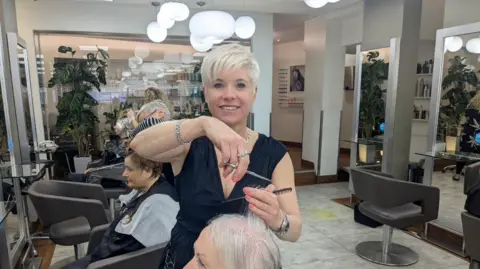In the current economic climate, small business owners, especially those in the personal care industry, are feeling the pressure from increased taxation and rising operational costs. A poignant example of this struggle is Kerry Larcher, a dedicated hairdresser from Hornchurch, East London, who fears losing both her salon and her home due to recent tax hikes. Kerry, who embarked on her journey as a business owner at the age of 21, has devoted 30 years to growing her establishment, the Vanilla Rooms. However, despite her long-standing commitment to the industry and her clientele, the recent increases in taxes imposed by the government are proving to be insurmountable hurdles.
Kerry’s situation has worsened significantly since the Chancellor’s October Budget, which imposed an additional burden of £23,000 per year on her already strained finances. She expressed her distress, stating, “I have been crying myself to sleep… this has been the worst period of my personal life in 30 years.” This emotional toll reflects the grave discomfort that many small business owners are facing, particularly as they grapple with unprecedented financial challenges. The looming specter of bankruptcy is palpable, and the pressure is mounting as she is forced to utilize her business reserves just to keep afloat.
The tax changes – primarily affecting employers’ National Insurance contributions and business rates – have compounded the struggles of salon owners across the UK. For Kerry, her contributions for staff wages have escalated from £42,000 to about £54,500, and her business rates spiked an astounding 144%, soaring from £700 to £18,000 a year. As a direct consequence, Kerry has been compelled to reduce the hours of her 12 apprentices while also signaling the grim possibility of halving their number within a year. “Where are the future hairdressers going to come from if good, employed salons go out of business?” she asks, highlighting the workforce impact of these financial strains.
The British Hair Consortium, which represents 50,000 hairdressing professionals like Kerry, has urged the government to take action to prevent the industry’s collapse. They argue that reducing VAT for salons – which predominantly hire women – could provide a measure of relief. This suggestion is underscored by the observation that salon labor, which constitutes 60% of their costs, remains unaccounted for under current VAT rules, compounding the challenges for such businesses.
Politically, this predicament has resonated within Parliament. Conservative MP Julia Lopez recently raised Kerry’s case during a Westminster Hall debate, emphasizing that many salon owners, particularly women, are considering closing their businesses altogether due to skyrocketing costs. Throughout these discussions, concerns have been raised regarding the implications of the Chancellor, Rachel Reeves, being celebrated as the first woman to hold that office while her policies potentially disadvantage predominantly female workforces.
Responding to these pressing concerns, Liberal Democrat business spokesperson Sarah Gibson highlighted that many salons are shifting to renting out chairs instead of employing stylists full-time. This shift is not only indicative of the dire financial circumstances but could also lead to decreased overall tax revenues for the government as more workers opt for self-employment in search of greater flexibility and financial viability.
Amidst this troubling backdrop, the Labour government’s Small Business Minister Gareth Thomas defended the financial strategies proposed in the latest budget, claiming they are essential for long-term stability. He highlighted measures such as an increased employment allowance aimed at reducing National Insurance contributions for nearly a million employers.
Despite the government’s assurances of future support for the hair and beauty sector, many business owners like Kerry remain skeptical about the efficacy of such measures, particularly if they come too late to save their businesses. As Kerry Larcher’s story illustrates, the future of many hair salons and their devoted staff hangs in the balance, impacting not just the economy but the livelihood and aspirations of countless individuals who rely on these essential services. The resolution of these issues will require urgent action, lest the traditional high streets see their vibrant personal care industries dwindle.



